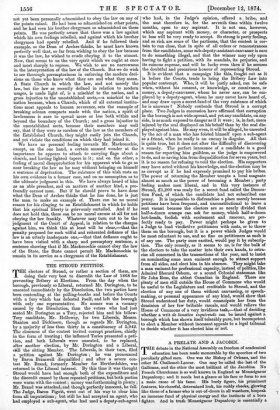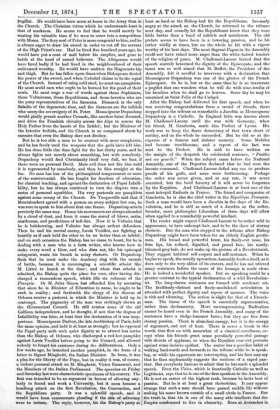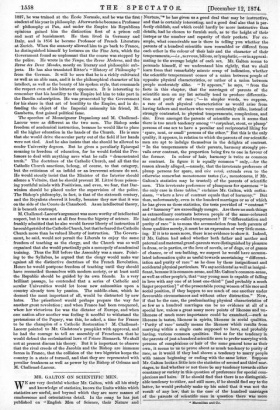A PRELATE AND A JACOBIN.
THE debate in the National Assembly on freedom of academical education has been made memorable by the speeches of two peculiarly gifted men. One was the Bishop of Orleans, and the other M. Challemel-Lacour. One may be called the last of the Gallicans, and the other the most brilliant of the Jacobins. No French Churchman is so well known in England as Monseigneur Dupanloup ; and it needs but a glance at his face or form to see a main cause of his fame. His burly figure, his prominent features, his cheerful, determined look, his ruddy cheeks, glowing like those of a farmer who is out-of-doors in all weathers, bespeak an immense fund of physical energy and the instincts of a born fighter. And in truth Monseigneur Dupanloup is essentially a
Pugilist. He would have been more at home in the Army than in the Church. The Christian virtue which he understands least is that of meekness. He seems to feel that he would merely be wasting his valuable time if he were to enter into a competition with Moses. The fiery soul of Peter is more congenial to him, and he is always eager to draw his sword in order to cut off the servant of the High Priest's ear. Had he lived five hundred years ago, he would have put a coat of mail below his surplice, and gone to battle at the head of armed believers. The Albigenses would have fared badly if he had lived in the neighbourhood of their unlicensed worship. He would have smitten the Huguenots hip and thigh. But he has fallen upon times when Bishops are denied the power of the sword, and when Unbelief claims to be the equal of the Church. Instead of using cold steel, he must use pamphlets.
He must scold men who ought to be burned for the good of their souls. He must wage a war of words against those Sophisters, those Voltaireans, those Republicans, and those heretics who are the puny representatives of the Saracens. Bismarck is the only Saladin of the degenerate time, and the Saracens are the infidels who usurp the sovereignty of St. Peter. Monseigneur Dupanloup would gladly preach another Crusade, like another Saint Bernard, and drive the Frankish chivalry across the Alps to rescue the Holy Father from the hands of the Infidel ; but the Minister of the Interior forbids, and the Church is so compassed about by enemies that even the Bishop dare not disobey.
But he is too able a man to be content with mere complaints, and he has freely used the weapons that the gods have left him.
He has done little else than fight for the last thirty years, and be always fights not merely about something, but with somebody. Dupanloup would find Christianity itself very dull, we fear, if there were no personal Devil. Mere evil does not fire him until it is represented by somebody, and then he flies straight at the foe. No man has less of the philosophical temperament or more of the controversial. He has fought for freedom of education, for classical teaching, and against the declaration of Papal Infalli- bility, but he has always contrived to turn the dispute into a series of personal squabbles. His very pastorals are pamphlets against some enemy of the Church. De Tocqueville said that if Montalembert agreed with a person on every subject but one, he was sure to speak to him about that one theme. Dupanloup acts in precisely the same way. Hence his movements are always attended by a cloud of dust, and from it come the sound of blows, oaths, anathemas, and predictions of hell-fire. Now it is Voltaire that he is belabouring, and Voltaire has always ardent defenders.
Then he and his mortal enemy, Louis Veuillot, are fighting as heartily as if each held the other to be no better than an infidel ; and on such occasions the Bishop has no cause to boast, for he is dealing with a man who is a born writer, who knows how to make every word a blow, and who does not, like his episcopal antagonist, waste his breath in noisy rhetoric. Or Dupanloup finds that he must make the Academy ring with the sounds of battle, because it is encouraging a scientific atheist like M. Littre to knock at the door ; and when that atheist is admitted, the Bishop quits the place for ever, after having dis- charged a tremendous speech, which fills six columns of the
Francais. Or M. Jules Simon ha a offended him by assuming
that since be is Minister of Education in name, he ought to be such in reality ; and forthwith the clergy of the diocese of Orleans receive a pastoral, in which the Minister is held up to contempt. The pugnacity of the man was strikingly shown at the (Ecumenical Council. He still retains some of the old Gallican independence, and he thought, if not that the dogma of Infallibility was false, at least that the declaration of it was inop- portune. Monseigneur Darboy, the late Archbishop of Paris, held the same opinion, and held it at least as strongly; but he opposed the Papal party with such quiet dignity as to attract less notice than the Bishop of Orleans, who discharged a red-hot pamphlet
against Louis Veuillot before going to the Council, and allowed nobody to forget his existence during the deliberations. • Only -a, few weeks ago, be launched another pamphlet, in the form of a letter to Signor Minghetti, the Italian Minister. In form, it was a plea for the liberty of the Pope, but in reality it was, of course, a violent personal attack on M. Minghetti, Victor Emannuel, and the Members of the Italian Parliament. The speeches on Friday and Saturday last were characteristic specimens of his oratory. The first was intended to be an argument in favour of allowing any- body to found and work a University, but it soon became a headlong attack on the first Revolution, the Convention, and the Republican party. It was a splendid speech, and it would have been consummate pleading if the aim of advocacy were to irritate. The reply, however, hit the Bishop's party at
least as hard as the Bishop had hit the Republicans. Intensely angry at the attack on the Church, he returned to the tribune next day, and roundly let the Republicans know that they were little better than a band of infidels and murderers. The old prelate seems to have been in a towering passion, and he hit rather wildly at times, but on the whole he hit with a vigour worthy of his best days. The most flagrant Pagan in the Assembly could not have raised more anger than the white-haired teacher of the religion of peace. M. Challemel-Lacour hinted that the speech scarcely beseemed the dignity of the Episcopate, and the taunt was so well aimed that M. Buffet, the President of the Assembly, felt it needful to intervene with a declaration that Monseigneur Dupanloup was one of the glories of the French Episcopate. So he is, but at the same time he is so inveterate a pugilist that one wonders what he will do with nine-tenths of his faculties when he shall go to heaven. Some day he may be canonised as Saint Felix of the Cudgel.
After the Bishop had delivered his first speech, and when he was receiving congratulations from a crowd of friends, there stepped into the tribune as remarkable a Jacobin as Monseigneur Dupanloup is a Catholic. In England little was known about M. Challemel-Lacour until the war with Germany, when his friend, M. Gambetta, made him Prefect of Lyons. His work was to keep the fierce democracy of that town short of mutiny, and on the whole he succeeded. But he did so at the expense of a famous and sinister memory. Some Mobiles had become troublesome, and a report of the fact was sent to the Prefect. He is said to have written on the margin of the despatch the celebrated sentence, " Fusiffez moi ces gens-la." When the subject came before the National Assembly, one of the Deputies declared that he had seen the laconic command. Challemel-Lacour defied any one to produce proofs of his guilt, and none were forthcoming. Perhaps the order was never given, and at any rate, it was never executed, but the brief ferocity of it will never be forgotten by the Royalists. And Challemel-Lacour is at least one of the most intrepid Radicals in France. The friend and companion of Gambetta, he is also the chief writer in the Ripubligue Frangaise. Such a man would have been a Jacobin in the days of the Re- volution, and he is still as much of a Jacobin as the softer, broader, more philosophic Liberalism of these days will allow when applied to a remarkably powerful intellect.
The reader might expect Challemel-Lacour to be rather wild in appearance, to have unkempt hair, and to be the slave of stormy rhetoric. But the man who stepped to the tribune after Bishop Dupanloup might have been taken for an elderly English gentle- man. His broad and powerful brow, his finely-cut nose, his firm lips, his refined, dignified, and proud face, his neatly- trimmed grey hair, do not make up the picture of a Revolutionist. They suggest habitual self-respect and self-restraint. When he begins to speak, the usually uproarious Assembly hushes itself, as it does only to the very ablest of its orators, and he has not uttered many sentences before the cause of the homage is made clear. He is indeed a wonderful speaker. But no speaking could be a greater contrast to the typical declamation of a wild Revolution- ist. The long-drawn sentences are formed with academic art. The faultlessly-distinct and finely-modulated articulation is attended with perfect dignity and repose of manner. The voice is rich and vibrating. The action is slight for that of a French- man. The tissue of the speech is essentially argumentative, rather than declamatory. More uncompromising Radicalism cannot be heard even in the French Assembly, and many of the sentences have a sledge-hammer force ; but they are free from stormy passion. There is abundant energy, but it is the energy of argument, and not of heat. There is never a break in the words that flow on with somewhat of a classical stateliness, ex- cept when his friends greet some peculiarly powerful passage with shouts of applause, or when the Royalists roar out protests against some incisive epithet. The orator has a peculiar habit of walking backwards and forwards in the tribune while he is speak- ing, or while his opponents are interrupting, and his foes may say that he then unpleasantly suggests the motions of a caged pan- ther. But everybody hastens to admit that be has made a splendid speech. Even the Union, which is fanatically Catholic as well as Legitimist, says that he is one of the first speakers in the Assembly. He is not an orator of the highest rank, because he lacks heat of passion. But he is at least a great rhetorician. It may appear strange that such a man should have passed middle life without making his name known outside of a small circle in France. But the truth is, that his is one of the many able intellects that the Empire condemned to live in obscurity. Born at Avranches in 1827, he was trained at the tcole Normale, and be was the first student of his year in philosophy. Afterwards he became a Professor of philosophy at Pau, and under the Empire his Republican opinions gained him the distinction first of a prison cell and next of banishment. He then lived in Germany and Italy, and in 1856 he became Professor of French Literature at Zurich. When the amnesty allowed him to go back to France, he distinguished himself by lectures on the Fine Arts, which the Government found so unpleasant that the course was stopped by the police. He wrote in the Temps, the Revue Moderne, and the Revue des Deux Mondes, mostly on literary and philosophic sub- jects. He has also translated Ritter's "History of Philosophy" from the German. It will be seen that he is a richly cultivated as well as an able man, and it is the philosophical character of his intellect, as well as the beauty of his spoken style, that commands the respect even of his bitterest opponents. It is interesting to remember that his hostility to the Empire led him to take part in the Bandin subscription. He was prosecuted by the Government for his share in that act of hostility to the Empire, and in de- fending the object of the Imperial animosity his friend, M. Gambetta, first gained political fame.
The speeches of Monseigneur Dnpanloup and M. Challemel- Lacour were as different as the two men. The Bishop seeks freedom of academical instruction, because he would like to place all the higher education in the hands of the Church. He is sure that she would drive the secular party out of the field if her hands were not tied. And he also insists that she should be allowed to confer University degrees. But he gives a peculiarly Episcopal meaning to freedom of education, for he would forbid the Pro- fessors to deal with anything save what he calls "demonstrated truth." The doctrines of the Catholic Church, and all that the Catholic Church sanctions, belong, of course, to that category, but the criticisms of an infidel or an irreverent science do not. He would stoutly insist that the Minister of the Interior should silence a Voltaire, that he should prevent M. Littre from poison- ing youthful minds.with Positivism, and even, we fear, that Dar- winism should be placed under the supervision of the police. The Bishop's philosophy, in fact, is that of the sixteenth century, and the Royalists cheered it loudly, because they saw that it was on the side of the Comte de Chambord. As an intellectual theory, it is beneath contempt.
M. Challemel-Lacour's argument was more worthy of intellectual respect, but it was not at all free from the bigotry of science. He frankly admitted that he also would favour liberty of instruction if he could getrid of the Catholic Church, but that he feared the Catholic Church more than he valued liberty of instruction. The Govern- ment, he said, would not permit the Liberals to enjoy the same freedom of teaching as the clergy, and the Church was so well organised that she would practically gain a monopoly of academical training. Thus the Bill before the Assembly was a snare. Point- ing to the Syllabus, he argued that the clergy would make war against all the distinctive doctrines of the French Revolution. Hence he would postpone freedom of teaching until they should have reconciled themselves with modern society, or at least until the Republic should be guided by its own friends. In a very brilliant passage, he contended that a series of Catholic and secular Universities would let loose new animosities upon a country already torn by passion. The middle-class, which he deemed the most important of all, would be distracted by new hates. The priesthood would perhaps prepare the way for another great revolution ; and when France had been conquered, when her victorious foe was the dictator of Europe, and when one nation after another was feeling it needful to withstand the pretensions of the Papacy, was this, he asked, a time for France to be the champion of a Catholic Restoration? M. Challemel- Laconr pointed to Mr. Gladstone's pamphlet with approval, and he had the courage to tell an assembly of Frenchmen that he would defend the ecclesiastical laws of Prince Bismarck. We shall not at present discuss his theory. But it is important to observe that the rival creeds of the Jacobin and the Bishop are immense forces in France, that the collision of the two bigotries keeps the country in a state of turmoil, and that they are represented with peculiar frankness as well as power by the Bishop of Orleans and M. Challemel-Lacour.








































 Previous page
Previous page